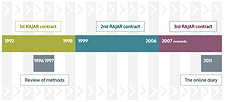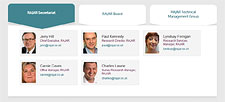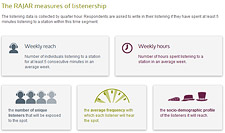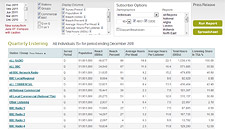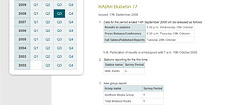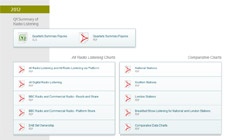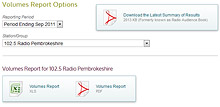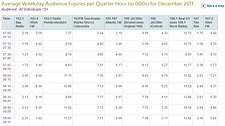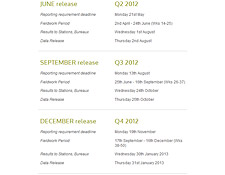News -
General
RAJAR commits £500,000 to roadmap to change and announces next stage of audiometer tests
Issued: April 22 2005
- The RAJAR board has committed a further £500,000 to the next stage of its roadmap to change
- Extensive national fieldwork tests, in partnership with Arbitron and Eurisko, to commence in June 2005
- Over 3,500 adults to be recruited
The RAJAR board has agreed to commit a further £500,000 to fund the next stages of audiometer testing and analysis on two audiometers, the Arbitron Portable People Meter (PPM) and the Eurisko Media Monitor, as part of its roadmap to change, announced in September 2004. With the collaboration of the two audiometer manufacturers involved, Arbitron and Eurisko, RAJAR is to undertake the most extensive fieldwork tests to date in the UK.
Comments Sally de la Bedoyere, RAJAR’s managing director: "RAJAR’s additional investment of £500,000, on top of the £1.5 million we have already spent on audiometer testing, is further confirmation of our commitment to this ground breaking research. With this new cash injection and our working partnership with Arbitron and Eurisko, we are now not only able to implement the most extensive fieldwork tests ever undertaken in the UK, but also ensure we are on course with our roadmap to enhanced radio audio measurement, earmarked for 2007."
The national fieldwork tests are to commence on June 6, 2005 and run for a 12-week period. Their purpose is to monitor compliance as well as to ascertain the level and nature of the data recorded. These tests follow the findings of RAJAR’s Audiometer Validation Test, announced in February 2005, which resulted in RAJAR moving forward with two audiometers, the Arbitron PPM and the Eurisko Media Monitor (from a group of three devices) to this next stage of field testing."These fieldwork tests are to focus largely on compliance issues," continued de la Bedoyere, "and how respondents relate to the audiometers. In particular, we are looking to allay the concerns which arose from our last series of fieldwork tests. These include the actual time respondents put on the audiometers and whether they wear them all day; whether there is a time of day when they are less likely to wear them; whether there are any demographic groups which have a problem wearing them; and how children will cope with wearing/carrying them. The tests will also provide a first opportunity to analyse listening data which has been captured on a national basis, and ascertain whether there are any regional variances in the data, or, indeed, in compliance."
Three fieldwork tests are to take place involving a sample of 3,500 adults (15+) representative of the UK population. In addition, children aged 6+ are to be recruited at a rate of one per every ten adults. The Arbitron PPM is to be placed with both a fixed panel, similar to BARB, of 700 respondents (15+ plus children) and a rolling panel, similar to the current diary method, of 1400 respondents (15+ plus children); while the Eurisko Media Monitor is to be placed with a rolling panel of 1400 respondents (15+ plus children). Results of these fieldwork tests are to feed into the tendering process. In addition, the fieldwork test with the Arbitron PPM is to involve the encoding of a small number of television stations and RAJAR is to share compliance results with BARB (Broadcasters’ Audience Research Board).De la Bedoyere added: "RAJAR is delighted that BARB has accepted our offer to be involved in the fieldwork tests in this way. Contrary to any speculation, this is not part of a planned strategy to provide a single currency for television and radio broadcast, rather, it is an extremely pragmatic approach to accelerating learning, which can only serve to expand all our knowledge and understanding of the complexities of portable people meters. Rest assured the focus of RAJAR remains firmly on a roadmap to change designed to enhance audience measurement of BBC and Commercial radio stations."
Bjarne Thelin, chief executive of BARB said: "When BARB extended its research contracts last year, we outlined that we would be continually exploring new methods and technologies. The planned tests fit in with those aims as we will gather more information about PPMs and maximise our understanding of issues such as rates of human compliance with the audiometers. We are therefore pleased to contribute in some small part to the RAJAR tests."
ENDS
For further information please contact:
Penelope James, Penelope James Public Relations
Tel: 01303 844555 Mobile: 07860 162 231 E-mail: penelope@penelopejamespr.com
Notes for Editors
Audiometer tests to date
RAJAR has been reviewing the developments in radio audience electronic measurement since 1996 and working proactively toward the possible introduction of audiometers since 2001. To date the organisation has spent approximately £1.5 million on testing audiometers and is the only radio research body in the world to have tested both the Arbitron Portable People Meter and the GfK Radiocontrol watch simultaneously.
The following is an outline of RAJAR’s programme of audiometer testing of the Arbitron Portable People Meter, the GfK Radiocontrol watch and GfK/Telecontrol MediaWatch and the Eurisko Media Monitor
Audiometer tests on the Arbitron Portable People Meter and GfK Radiocontrol watch
JANUARY - MAY 2002
Acoustic tests
Which sounds/signals meters record in different environments?
Can they "hear" what people hear, particularly at low thresholds?
How does background noise affect their performance?
Do they cope equally well with music and speech-based formats?
Are they designed to identify different broadcast sources such as separate services (e.g. AM and FM, analogue and digital) and what might broadcasters need to do to differentiate their signals on different delivery platforms?
Placement tests
Do all/only some respondents accept the wearing of meters?
Will there be any demographic groups that may require a different approach?
What levels of incentive are required?
What about privacy issues?
MAY - AUGUST 2002
Compliance tests
Do respondents fully understand how to use the meters?
Will they remember/bother to wear them all day long?
How do children cope with wearing meters?
Qualitative tests
What did meter-wearers really think of the task?
In retrospect was there sufficient incentive to motivate them?
Is there anything that needs to be made clearer?
SEPTEMBER 2002 - MARCH 2003
3-6 month tests on both devices measuring listening
What are the key differences when compared with diary data?
Do meters give us more accuracy, a different kind of inaccuracy, or both?
Are all programme genres affected equally?
What editing rules should be applied to minimise misattribution and bridge gaps (missing minutes) in data capture?
NOVEMBER 2004
Audiometer Validation Test on the Arbitron Portable People Meter, the GfK/Telecontrol MediaWatch and the Eurisko Media Monitor
The objective of this pioneering test was to determine how well the audiometers - the Arbitron PPM, the GfK/Telecontrol MediaWatch and the Eurisko Media Monitor - could identify up to 33 different radio services (both music and speech-based) under as wide a variety of real life situations as possible.
RAJAR - Background
RAJAR is jointly owned by the BBC and the CRCA (Commercial Radio Companies Association). Its board includes BBC Radio, the Commercial Radio Companies Association (CRCA), the advertising industry, as represented by the Institute of Practitioners in Advertising (IPA), and the Incorporated Society of British Advertisers (ISBA). It is a deadlock company and all procedures are subject to shareholder agreement.
The RAJAR survey is the biggest audience research survey in the world outside North America and the most complex radio survey. It currently supplies radio audience listening data to over 300 UK radio stations broadcasting across a range of platforms including analogue, digital, digital TV, satellite and Internet.


